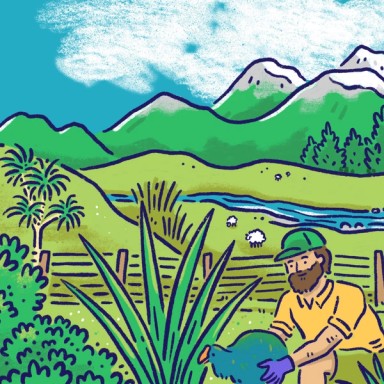
Party vote

Environment
Tackling climate change has been a priority of the current government since it was elected in 2017. But its climate policies have been met with resistance in some quarters, especially among farmers who say efforts to reduce emissions threaten the industry's bottom line. However, others say the government’s climate change measures don’t go far enough, as the devastating impacts of climate change become ever more visible.

Environment
Tackling climate change has been a priority of the current government since it was elected in 2017. But its climate policies have been met with resistance in some quarters, especially among farmers who say efforts to reduce emissions threaten the industry's bottom line. However, others say the government’s climate change measures don’t go far enough, as the devastating impacts of climate change become ever more visible.
End all climate taxes, subsidies and regulations
Prioritise long-term, nature-based solutions over short-term engineering solutions
Reform the Reserves Act to incorporate te Tiriti o Waitangi
Ban new mining on conservation land
Aim to double natural wetlands by 2050
Provide financial incentives to protect and enhance indigenous biodiversity
Increase funding for predator, weed and pest control
Continue funding Jobs for Nature
Eradicate pests on the sub-Antarctic Maukahuka Auckland Islands
Implement global biodiversity targets
Use proceeds from the visitor levy for conservation and biodiversity projects
Legislate for a right to a healthy environment
Ban products sourced from illegally logged forests
Increase funding to protect natural wetlands
Assist Pacific Island states in marine protection initiatives
Facilitate the return of wrongfully alienated land to tangata whenua
Fund the restoration and protection of nature in urban areas
Establish an ocean commission to provide advice and set targets for marine systems
Expand marine protected areas to cover 30 percent of NZ's oceans
Return conservation land to whānau, hapū and iwi
Acknowledge Māori rights over fresh water
Expand coverage of ban on mining in conservation land
Create a minister for hunting and fishing
Designate wapiti, sika and tahr as herds of special interest
Allow the Game Animal Council to make more decisions about game animal management
Recategorise game animals, trout and salmon
Establish national management plans for game animals
Guarantee managed access to public land for hunters and fishers
Create partnership agreements to maintain huts on conservation land
Oppose recreational licencing system for game animal hunting or sea fishing
Establish seats for hunters and fishers on conservation bodies
Review game animal management programmes
Narrow the scope of Significant Natural Areas
Amend rules for defining culverts and wetlands
Limit the scope of wetlands protections
Upgrade Waiau-Toa/Molesworth trail into a Great Walk
Require DOC to make concession decisions for tourism businesses within one year
Remove consent requirements for creating wetlands
Develop credit system to encourage conservation on private land
Create a process for community-led rāhui
Continue to support Jobs for Nature projects
Continue to support Jobs for Nature programme
Improve environmental reporting laws
Abolish Significant Natural Areas
Sell Landcorp and use proceeds to fund conservation on private land
Fund conservation initiatives on private land
End all climate taxes, subsidies and regulations
Prioritise long-term, nature-based solutions over short-term engineering solutions
Reform the Reserves Act to incorporate te Tiriti o Waitangi
Ban new mining on conservation land
Aim to double natural wetlands by 2050
Provide financial incentives to protect and enhance indigenous biodiversity
Increase funding for predator, weed and pest control
Continue funding Jobs for Nature
Eradicate pests on the sub-Antarctic Maukahuka Auckland Islands
Implement global biodiversity targets
Use proceeds from the visitor levy for conservation and biodiversity projects
Legislate for a right to a healthy environment
Ban products sourced from illegally logged forests
Increase funding to protect natural wetlands
Assist Pacific Island states in marine protection initiatives
Facilitate the return of wrongfully alienated land to tangata whenua
Fund the restoration and protection of nature in urban areas
Establish an ocean commission to provide advice and set targets for marine systems
Expand marine protected areas to cover 30 percent of NZ's oceans
Return conservation land to whānau, hapū and iwi
Acknowledge Māori rights over fresh water
Expand coverage of ban on mining in conservation land
Create a minister for hunting and fishing
Designate wapiti, sika and tahr as herds of special interest
Allow the Game Animal Council to make more decisions about game animal management
Recategorise game animals, trout and salmon
Establish national management plans for game animals
Guarantee managed access to public land for hunters and fishers
Create partnership agreements to maintain huts on conservation land
Oppose recreational licencing system for game animal hunting or sea fishing
Establish seats for hunters and fishers on conservation bodies
Review game animal management programmes
Narrow the scope of Significant Natural Areas
Amend rules for defining culverts and wetlands
Limit the scope of wetlands protections
Upgrade Waiau-Toa/Molesworth trail into a Great Walk
Require DOC to make concession decisions for tourism businesses within one year
Remove consent requirements for creating wetlands
Develop credit system to encourage conservation on private land
Create a process for community-led rāhui
Continue to support Jobs for Nature projects
Continue to support Jobs for Nature programme
Improve environmental reporting laws
Abolish Significant Natural Areas
Sell Landcorp and use proceeds to fund conservation on private land
Fund conservation initiatives on private land
Policies
Compare the parties’ positions on the key issues this election
Candidates
See the electorate candidates running in your local area
Parties
Learn about each political party, its leaders and candidate list
Compare the candidates running in your local area
Each part of the country is represented in Parliament by an electorate MP. We've asked every candidate about their priorities for your community and why they deserve your vote.












